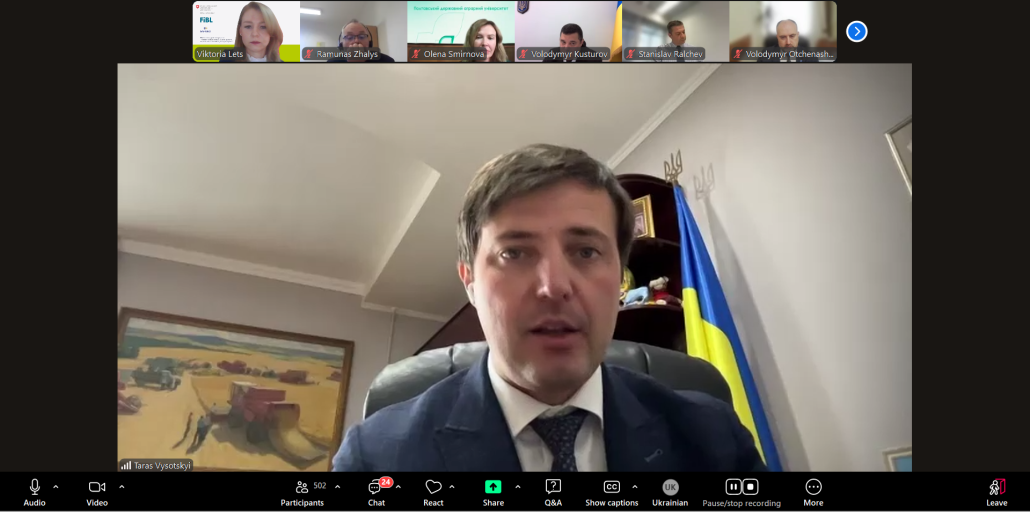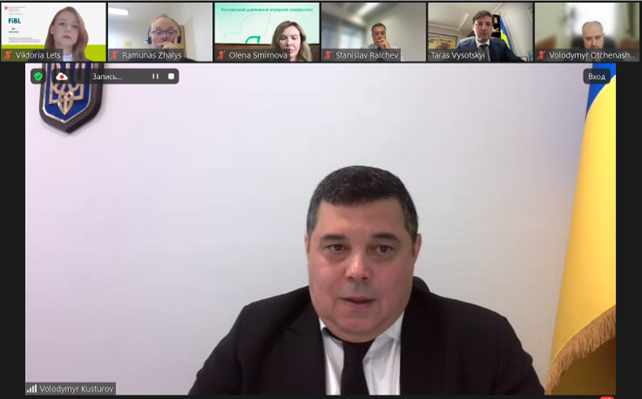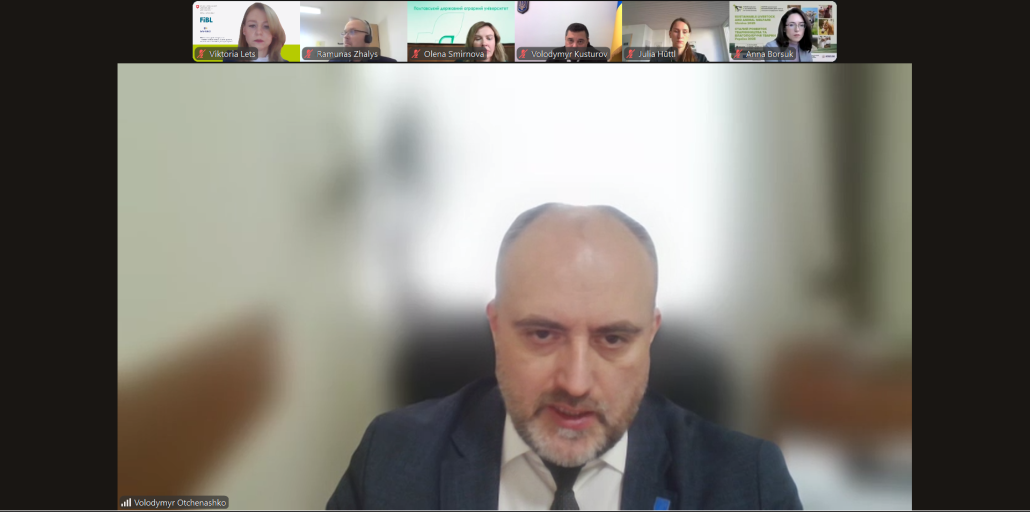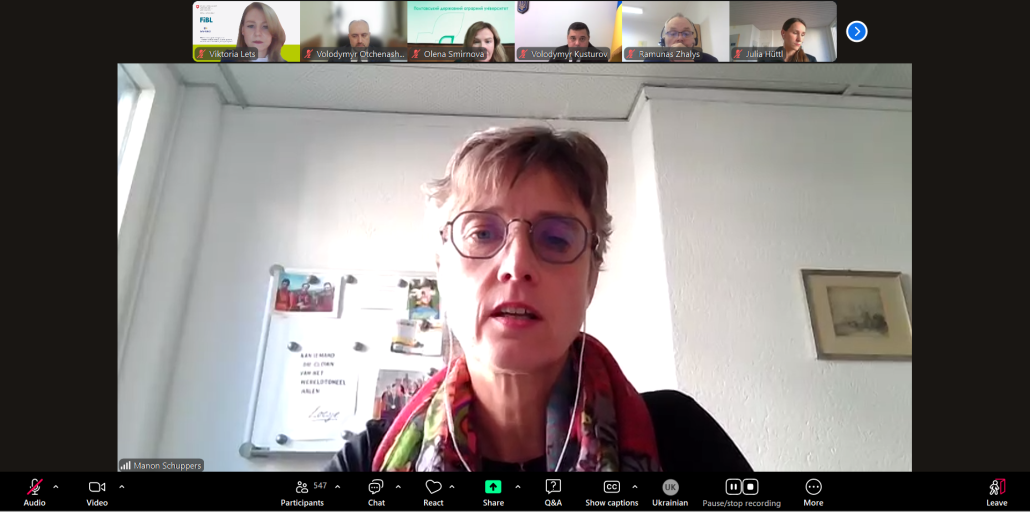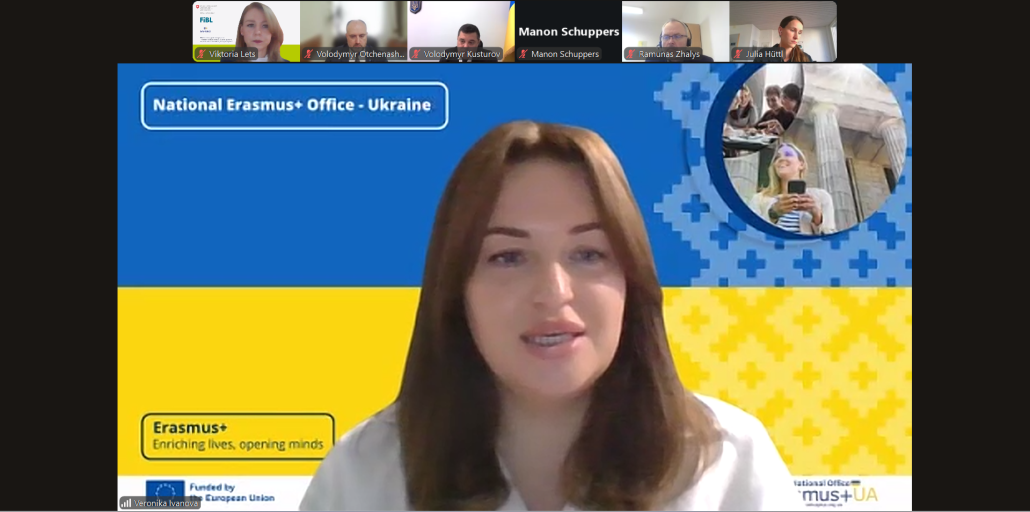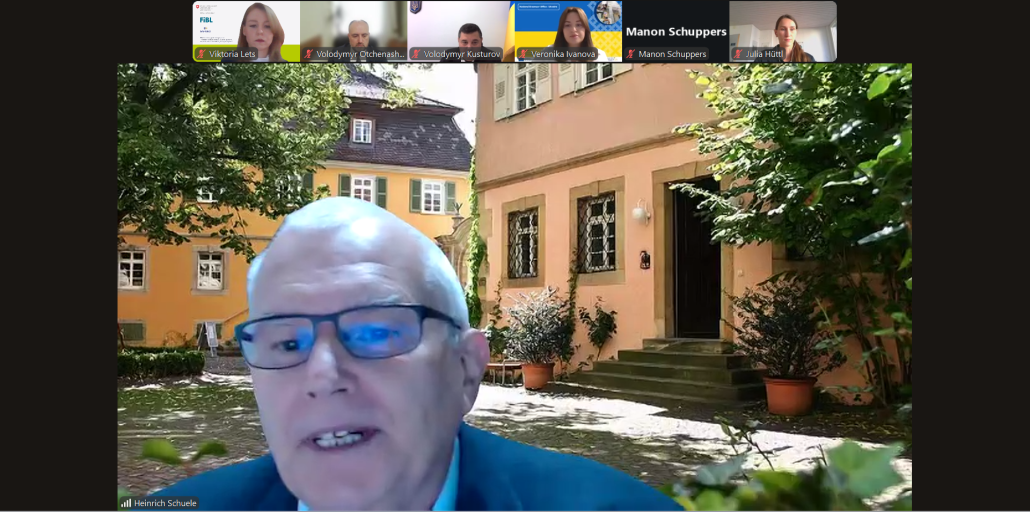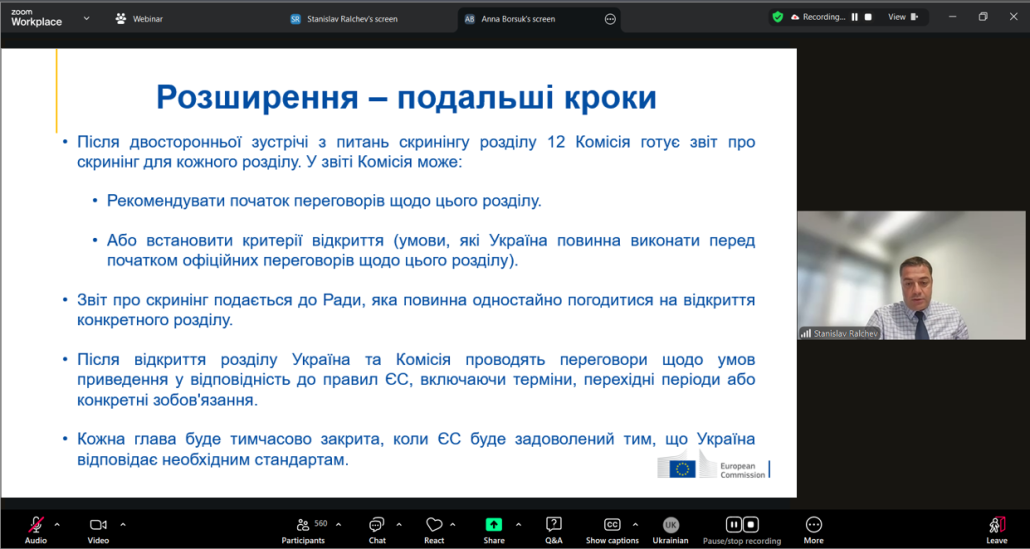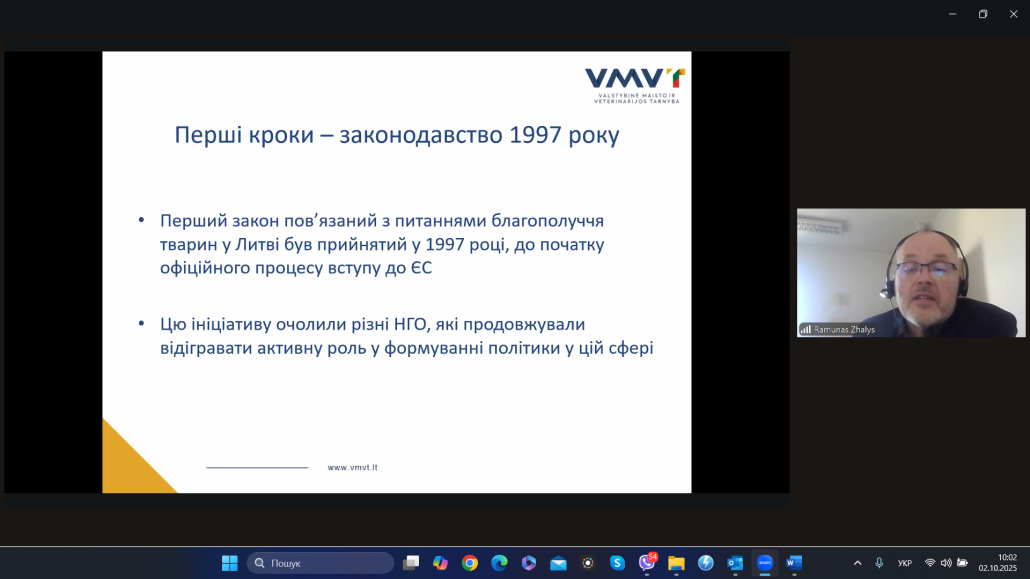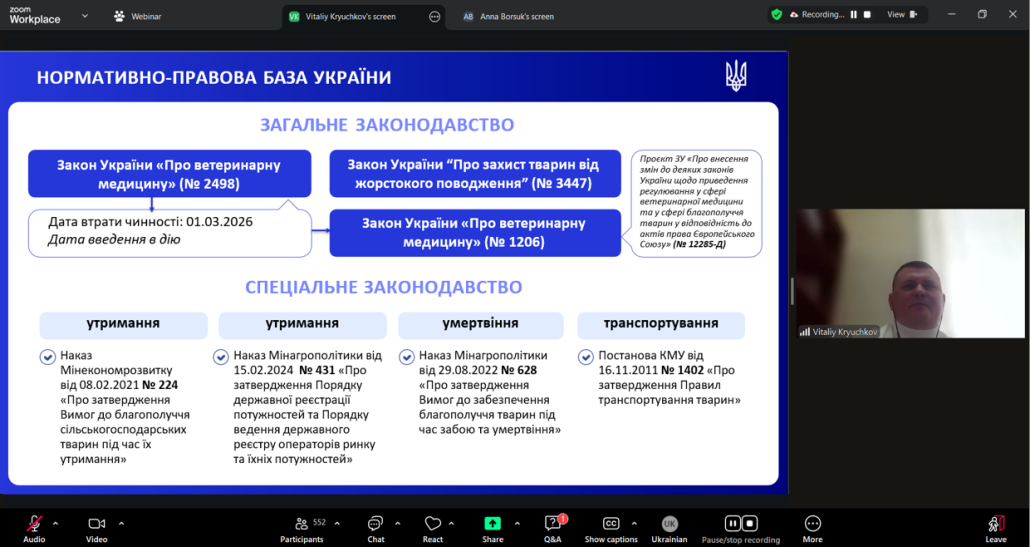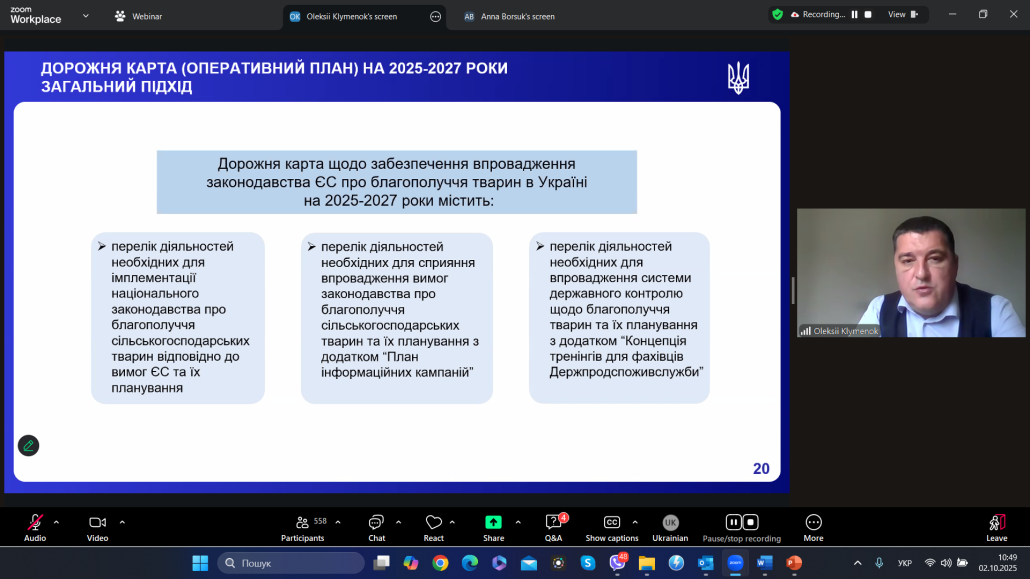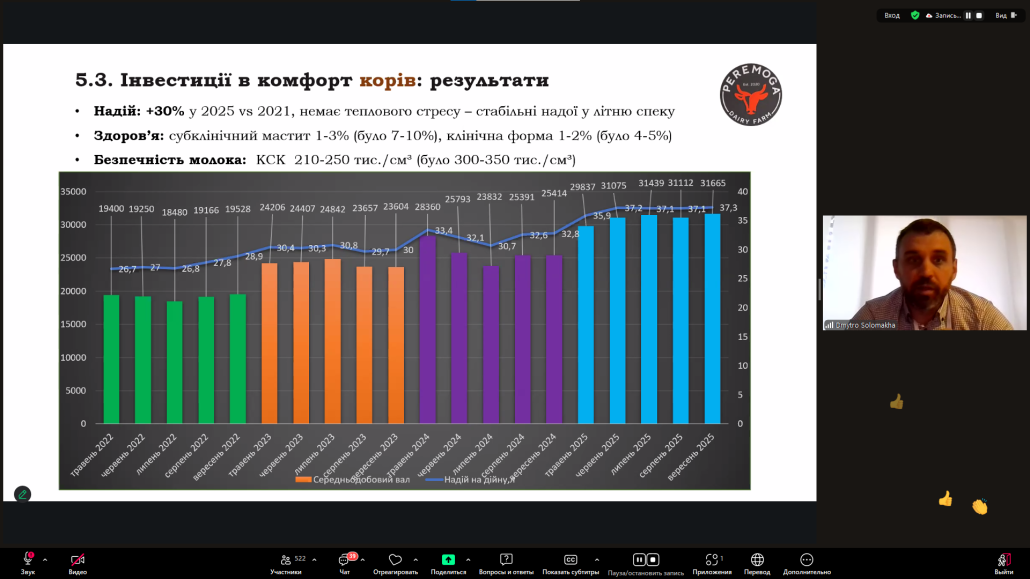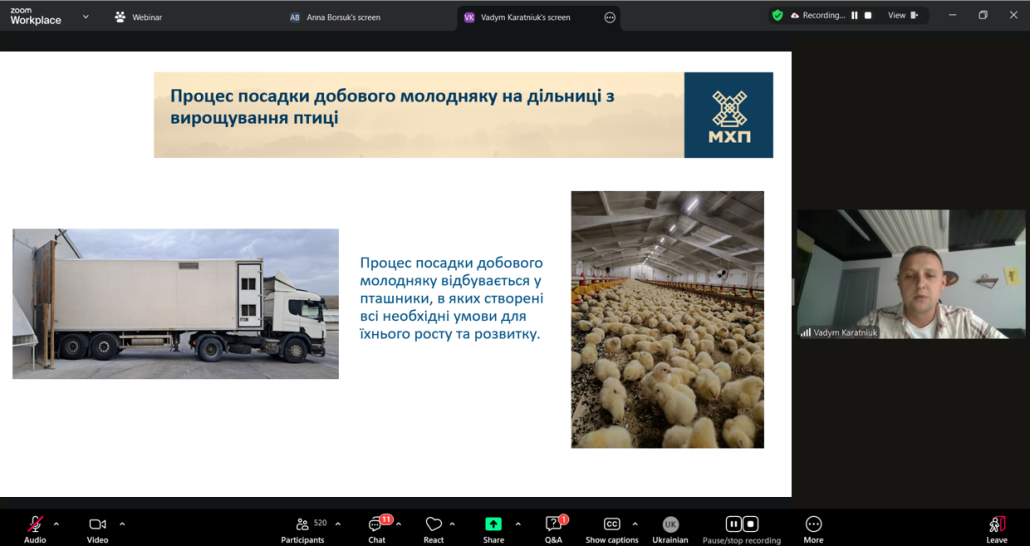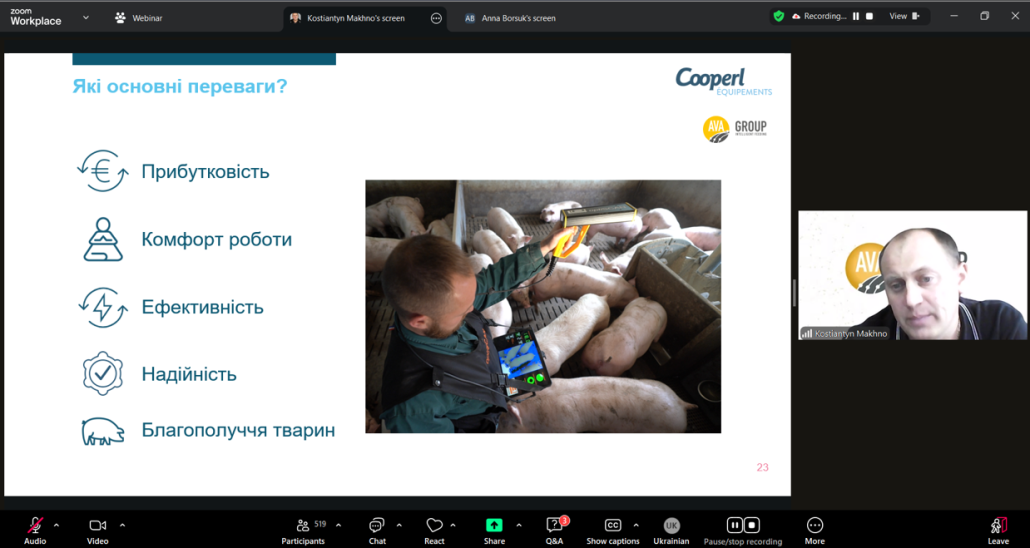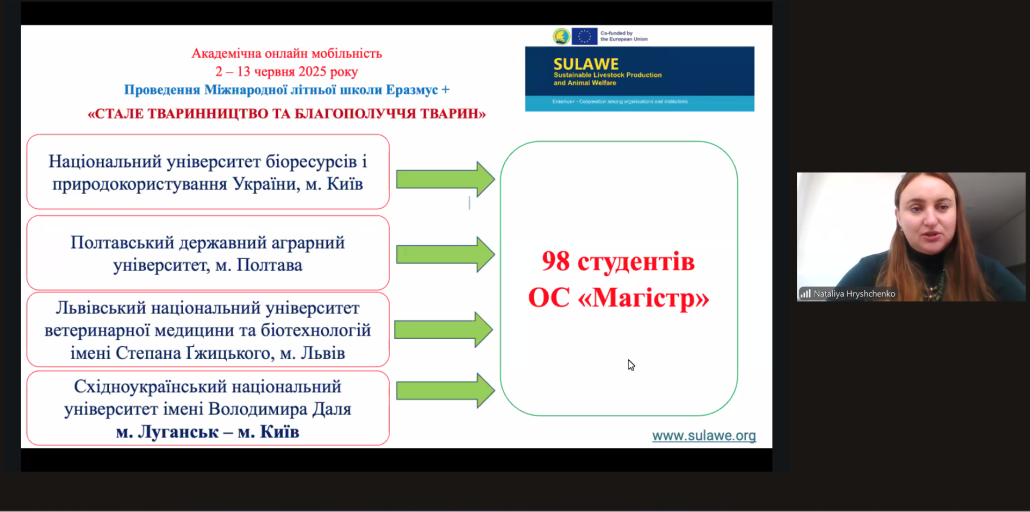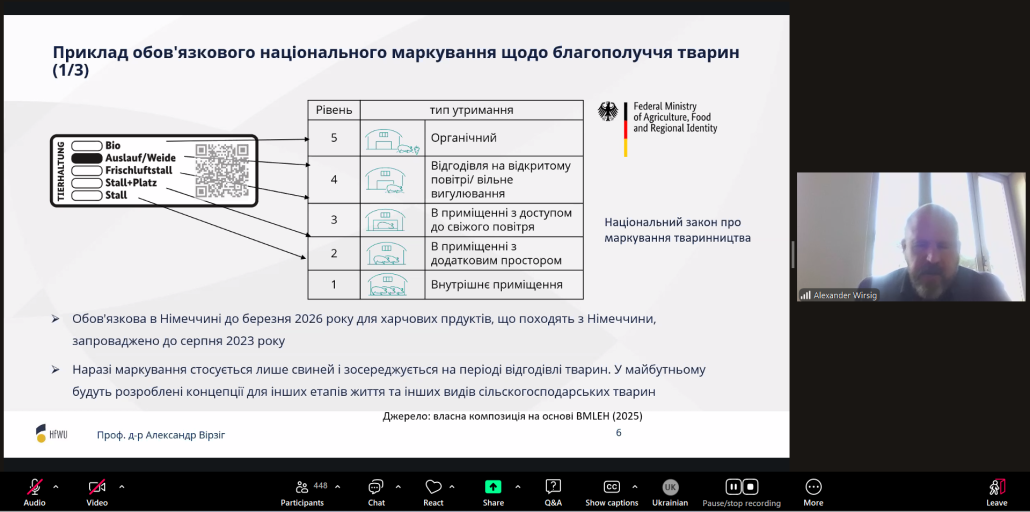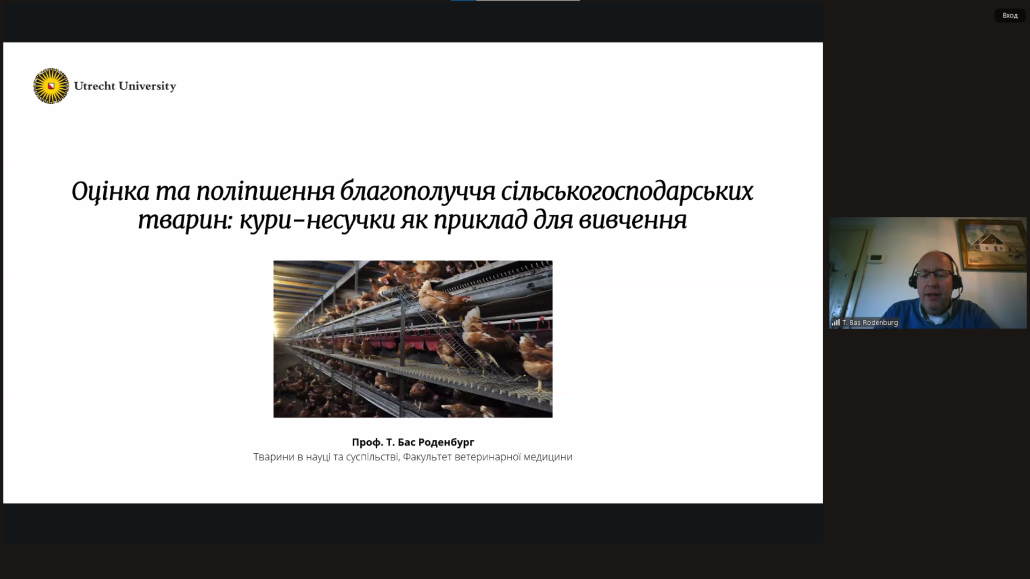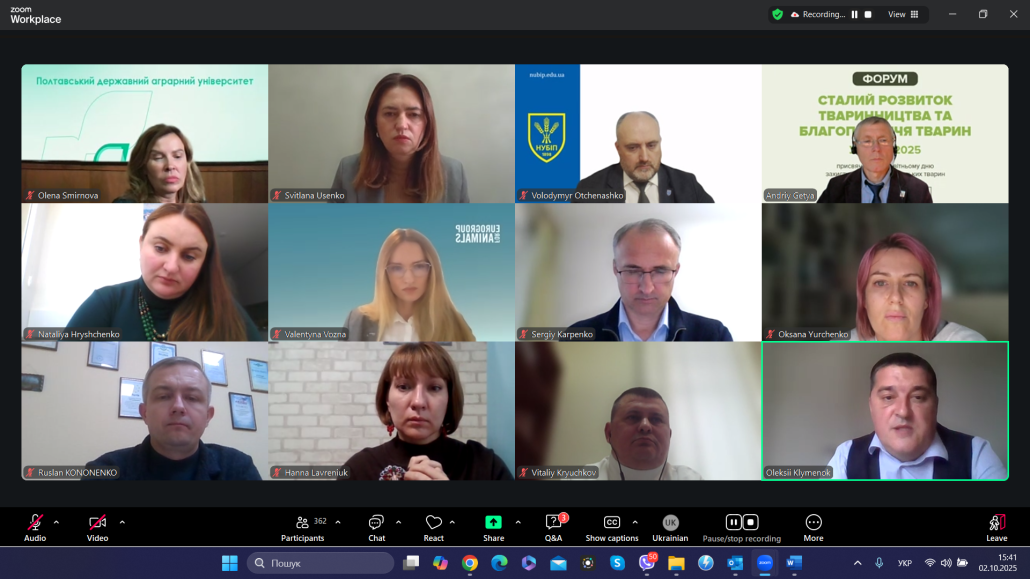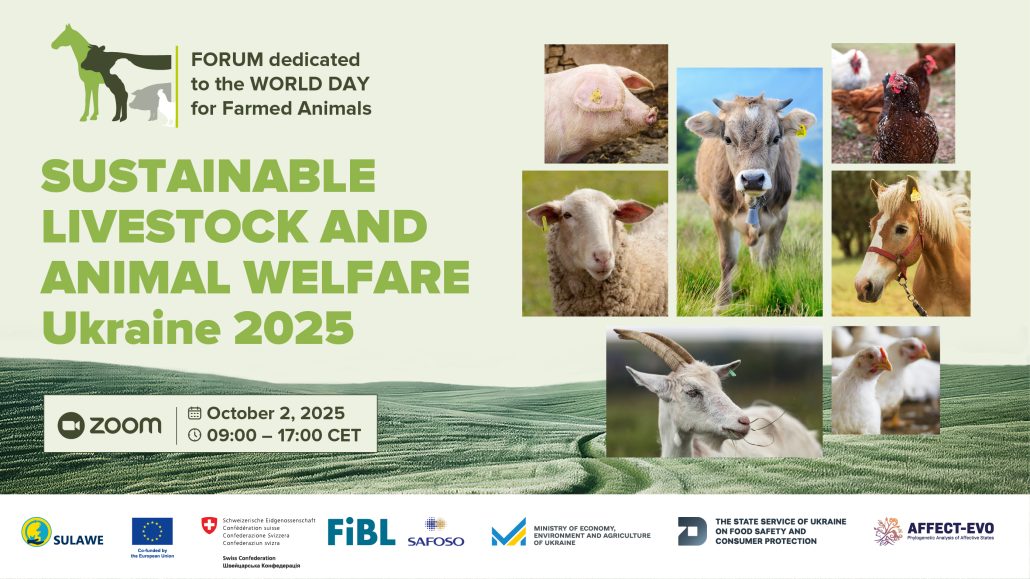
To mark World Day for Farmed Animals on 2 October 2025, Ukraine joined a global initiative and held an online forum «Sustainable Livestock and Animal Welfare – Ukraine 2025» (hereinafter – Forum).
The event aimed to raise awareness of the process of aligning national legislation with EU requirements in the field of animal welfare. It also sought to highlight the urgent need to ensure the effective implementation of farm animal welfare rules during their keeping, transport and slaughter.
The forum was attended by more than 560 participants, including representatives from the Ukrainian Ministry of Economy, Environment and Agriculture (hereafter – Ministry of Economy), the State Service of Ukraine for Food Safety and Consumer Protection (hereafter – SSUFSCP) at central and regional levels, as well as from professional and business associations, livestock farms, other business operators, scientific and educational institutions, consumer organisations and international technical assistance projects in the field of animal health and welfare.
In his welcome address, Taras Vysotskyi, Deputy Minister of Economy, Environment and Agriculture of Ukraine, emphasised the important role of the livestock sector in national and global food security. To ensure the effective development of the industry during the process of European integration, Ukrainian agricultural producers must therefore adhere to two main production principles: sustainable development and animal welfare.
«Sustainable development and animal welfare are irreversible trends and mandatory requirements for all agricultural producers. As part of its European integration process, Ukraine has the potential to produce significantly more than is needed for the domestic market, enabling it to expand exports to various global markets. At the same time, compliance with animal welfare requirements is a prerequisite. From the beginning of 2026, these requirements will be mandatory for all business operators who keep farmed animals», emphasised Taras Vysotskyi.
Volodymyr Kusturov, the Deputy Head of SSUFSCP, emphasised the important role of farmed animals’ welfare in ensuring food safety and developing exports to the EU: «An effective official control system is important not only for Ukraine’s European integration, but also for promoting ethical and sustainable animal husbandry, producing safe food products, and developing international trade. SSUFSCP is currently working to create a unified system for controlling animal welfare throughout the country. This involves developing control tools and training specialists».
Volodymyr Otchenashko, Professor, Head of the Research Department at the National University of Life and Environmental Sciences of Ukraine (hereafter – NUBiP of Ukraine), noted: «Success in promoting animal welfare and sustainable livestock is only possible through the collaboration of all stakeholders, and this forum provides a platform for knowledge exchange between the legislative, scientific, educational, business, and expert communities».
Manon Schuppers, Co-CEO SAFOSO AG and International Expert of Swiss-Ukrainian Programme «Higher Value Added Trade from the Organic and Dairy Sector in Ukraine» (hereinafter – QFTP), stated that the importance of implementing animal welfare requirements is growing in the context of Ukraine’s European integration. «The QFTP has considerable experience in providing advice on harmonising Ukrainian legislation with EU standards, implementing them, and establishing an official control system. World Day for Farmed Animals provides a valuable opportunity to discuss EU regulations and standards for animal welfare, as well as the challenges Ukraine faces in implementing them», she said.
Veronika Ivanova, Project Manager at the National Erasmus+ Office in Ukraine, added that the EU’s Erasmus+ programme provides Ukraine with a wide range of opportunities for international cooperation, encouraging the exchange of experiences and enhancing the quality of education: «The Project «Sustainable Livestock Production and Animal Welfare» (hereafter – SULAWE) has become a tool for integrating Ukrainian educational organisations into the European higher education area. It has also contributed to developing human capital, which forms the basis for a sustainable and successful future for our country».
Heinrich Schuele, professor at the Nuertingen-Geislingen University (Germany), Project Lead of the EU ERASMUS+ SULAWE project, emphasised that that improving animal welfare is not only about setting higher standards, but also about preparing the next generation to uphold them. «By updating educational programmes at agricultural universities in Ukraine, we ensure that future specialists are equipped with the knowledge, skills and values to turn these standards into everyday practice,» he said.
The first session, «Animal welfare policy: aligning with the EU», began with a presentation by Stanislav Ralchev, a policy officer at the Unit Animal Welfare of European Commission, DG SANTE. Mr Ralchev clarified current EU animal welfare requirements and plans to update them. He also discussed expectations for implementing these requirements in Ukraine, which is a candidate country for EU membership.
Ramunas Zhalys, a senior specialist of Animal Welfare Division of Food and Veterinary Policy Department, State Food and Veterinary Service of Lithuania, discussed the Lithuania’s experiences and challenges during implementation of animal welfare rues.
Vitalii Kryuchkov, Head of the Animal Health and Welfare Division of the Sanitary and Phytosanitary Measures Directorate, Department of State Policy on Sanitary and Phytosanitary Measures and Food Safety of the Ministry of Economy, presented the status of harmonisation of national legislation regarding the welfare of farmed animals to EU requirements.
Oleksii Klymenok, Head of the Animal Health and Welfare Unit of the Directorate of Animal Health and Welfare, Organization of Anti-Epizootic Measures of the Department of Food Safety and Veterinary Medicine, SSUFSCP, analysed the current status of implementation of the official control system on farmed animals‘ welfare in Ukraine.
During the second session, «From Farm to Compliance: Implementing Animal Welfare Rules», the focus was on sharing practical experiences, challenges and best practices related to the implementation of animal welfare regulations on Ukrainian farms with various species of animals. The session also explored the benefits that farms can gain from enhancing animal welfare.
Dmytro Solomakha, Director of JSC «Peremoha», shared farm’s experience of milk production, as well as the economic results of investing in the welfare of cows and calves made after the full-scale invasion. In his presentation, he emphasized that investments in animal welfare and staff training are not only about complying with legal requirements, but also a way to improve the farm’s production efficiency and economic performance.
Vadym Karatnyuk, Leading zootechnician at the branch «Poultry complex», Vinnytsia Poultry Farm LLC, highlighted the specifics of implementing welfare requirements for broiler farming. He also gave examples of best practices that promote poultry health and higher productivity.
Nataliya Hrishchenko, Associate Professor of Department of Technologies in Poultry, Pig and Sheep Breeding of Faculty of Animal Husbandry and Aquatic Bioresources, NUBiP of Ukraine, analysed the main challenges faced by pig farms and justified the need to introduce transition periods for legislative requirements. Konstantin Makhno, Innovation Manager at AVA Group, presented innovative solutions for pig farming that will help to ensure that animal welfare requirements are met.
The third session, «Educating for change: building a welfare-ready sector» explored how modern education and training programmes prepare specialists to implement animal welfare standards in Ukraine. It also examined which educational or scientific initiatives could encourage producers to comply with European standards and influence society’s attitude towards animal welfare.
Nadiya Magrelo, Associate Professor of Department of Hygiene, Sanitation and General Veterinary Prevention, Stepan Gzhytskyi National University of Veterinary Medicine and Biotechnologies Lviv, Olena Smirnova, International Affairs Expert, Poltava State Agrarian University, and Nataliya Hrishchenko presented the results of the SULAWE project over three years.
Alexander Wirzig, Professor for Policy and Markets of the Agri-Food Sector, Nuertingen-Geislingen University, Germany explained different food labeling systems related to animal welfare in various countries and their impact on consumers.
T. Bas Rodenburg, Professor for Animal Welfare, Faculty of Veterinary Medicine, Utrecht University, Netherland, highlighted approaches to assessing the welfare of laying hens and explained how these contribute to improving welfare conditions.
The event concluded with a cross-sectoral panel discussion «Advancing animal welfare in Ukraine – joining forces for sustainable livestock». Representatives of the Ministry of Economy, the SSUFSCP, professional associations, civil society organizations, and higher education institutions discussed how Ukraine’s livestock sector is transforming under numerous challenges, including the ongoing war and the EU accession process. The discussion highlighted the key challenges and pathways for promoting farmed animals’ welfare, emphasizing the importance of collaboration between government, business, and academia in building a sustainable livestock sector.
Throughout the event, participants were highly engaged, asking numerous questions to the speakers and panellists, which demonstrated the relevance and importance of the Forum’s topic.
The event was held as part of the Information Campaign Plan, an annex to Roadmap for the implementation of EU animal welfare legislation in Ukraine (2025–2027). (hereinafter – Roadmap).
The QFTP experts will continue to support the Ministry of Economy and the SSUFSCP in implementing the activities set out in the Roadmap, particularly those relating to the dairy sector.
The presentation materials from the event can be found on the QFTP website, under the “Publications: Regulatory and legal framework“.
A video recording of the event is available at the following link.
See below for infographics on animal welfare requirements for farmed animals during their keeping.
Requirements for the welfare of farmed animals during their keeping (in Ukrainian only)
Requirements for the welfare of calves during their rearing (in Ukrainian only)
Requirements and recommendations for the welfare of dairy cows during their rearing (in Ukrainian only)
The event is organised by:
- SULAWE project, financially supported by the European Commission’s Education, Audiovisual and Culture Executive Agency (EACEA) under the grant ‘Sustainable Livestock Production and Animal Welfare’;
- Swiss-Ukrainian Programme“Higher Value Added Trade from the Organic and Dairy Sector in Ukrain”(QFTP) implemented by the Research Institute of Organic Agriculture (FiBL, Switzerland) in partnership with SAFOSO AG (Switzerland);
- COST Action AFFECT-EVO (CA23106), which is funded by COST (European Cooperation in Science and Technology);
- in cooperation with the Ministry of Economy, Environment and Agriculture of Ukraine and the State Service of Ukraine for Food Safety and Consumer Protection.
